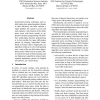Free Online Productivity Tools
i2Speak
i2Symbol
i2OCR
iTex2Img
iWeb2Print
iWeb2Shot
i2Type
iPdf2Split
iPdf2Merge
i2Bopomofo
i2Arabic
i2Style
i2Image
i2PDF
iLatex2Rtf
Sci2ools
110
click to vote
ACL
2010
2010
Dynamic Programming for Linear-Time Incremental Parsing
Incremental parsing techniques such as shift-reduce have gained popularity thanks to their efficiency, but there remains a major problem: the search is greedy and only explores a tiny fraction of the whole space (even with beam search) as opposed to dynamic programming. We show that, surprisingly, dynamic programming is in fact possible for many shift-reduce parsers, by merging "equivalent" stacks based on feature values. Empirically, our algorithm yields up to a five-fold speedup over a state-of-the-art shift-reduce dependency parser with no loss in accuracy. Better search also leads to better learning, and our final parser outperforms all previously reported dependency parsers for English and Chinese, yet is much faster.
ACL 2010 | Computational Linguistics | Dependency Parsers | Parsers | Shift-reduce Dependency Parser |
| Added | 10 Feb 2011 |
| Updated | 10 Feb 2011 |
| Type | Journal |
| Year | 2010 |
| Where | ACL |
| Authors | Liang Huang, Kenji Sagae |
Comments (0)

